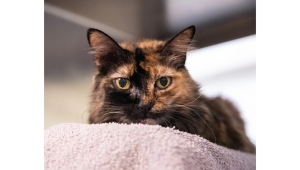It’s no myth, pet cats need yearly veterinary checkups to ensure a healthy long life

Fourteen-year-old Selina is a sweet senior kitty looking for a warm lap to curl up on! She likes being pet and especially loves getting delicious cat treats. Beautiful Selina is looking for a loving home to spend her golden years! View photos of adoptable pets and schedule an adoption appointment at pasadenahumane.org
Throughout my life, I’ve heard my share of cat myths. You know the ones. Cats always land on their feet. Cats have nine lives. Cats are nocturnal.
Most myths are harmless, but there is one myth that is cause for concern: that pet cats don’t need regular veterinary checkups.
Now, if your cat is anything like my poor cat Tubby, rest his soul, a trip to the vet can be a challenging experience for both of you. Tubby seemed to sprout four extra legs and double in size any time he had to go in a carrier. His pitiful cries of distress during the seemingly endless car ride brought me to tears.
Unfortunately, I didn’t know at the time that it is possible to train a cat to use a carrier, and there are other techniques to decrease the stress of visiting the doctor.
We adopted Tubby as a senior, and he was only with us for a few years. I’ll never know for sure, but with more routine veterinary care, it’s possible Tubby might have been with us a little longer. We avoided the stressful trips to the vet, until one day Tubby suddenly displayed severe distress from congestive heart failure.
The truth is that cats, just like dogs and humans, need to have annual health and wellness exams. Visiting the veterinarian is just as crucial for a kitten’s health as it is for the well-being of adult and senior cats. And here are some reasons why:
Cats are masters at hiding illness
Since cats may rarely show signs of illness, a yearly checkup is one of the best ways to keep your feline in the best possible health. These annual visits allow your veterinarian to notice any changes in your cat’s condition from year to year and help you catch potentially serious issues early.
Vaccinations are a key to long-term wellness
As kittens, cats receive a series of vaccines to protect them from common diseases. At your cat’s annual exam, your vet will review any necessary booster shots and updates to your cat’s vaccination schedule to keep them healthy.
Spay and neuter promotes a healthy life
Spaying and neutering eliminate the risk for certain types of cancer and helps prevent nuisance behaviors like spraying or marking. Plus, it prevents unwanted litters and is part of the solution to solve pet overpopulation in shelters.
Dental disease can be dangerous
During an annual exam, your vet will check your cat’s teeth to ensure they are clean, and that there are no loose teeth, gum disease or signs of infection. In some cases, your veterinarian may recommend a dental cleaning or tooth extractions under anesthesia.
You are what you eat
Your veterinarian can provide guidance on helping your cat maintain a healthy weight and can point you towards a high-quality food specially formulated to meet the specific nutritional requirements of your cat’s age and lifestyle.
Litter box issues may be a sign of something bigger
When everything else appears normal, one place where early signs of an illness can show up is the litter box. If your cat’s litter box habits change or if you notice a change in the condition of the box contents, take your pet to the vet as soon as possible.
If you do not already have a veterinarian you trust with your pet’s health, it’s important to plan ahead to find a veterinary practice in your area that is accepting new patients. With the current shortage of veterinary health professionals, many practices are scheduling visits several weeks out. Don’t forget to familiarize yourself with nearby veterinary hospitals offering 24-hour care in case of emergencies.
Dia DuVernet is president and CEO of Pasadena Humane.
This blog post originally appeared as a column in the Pasadena Star-News on April 1, 2022.



